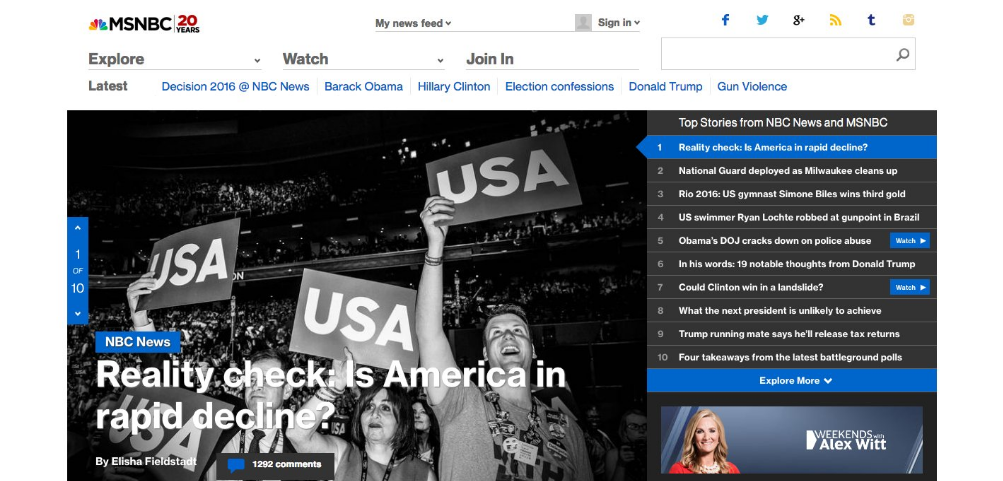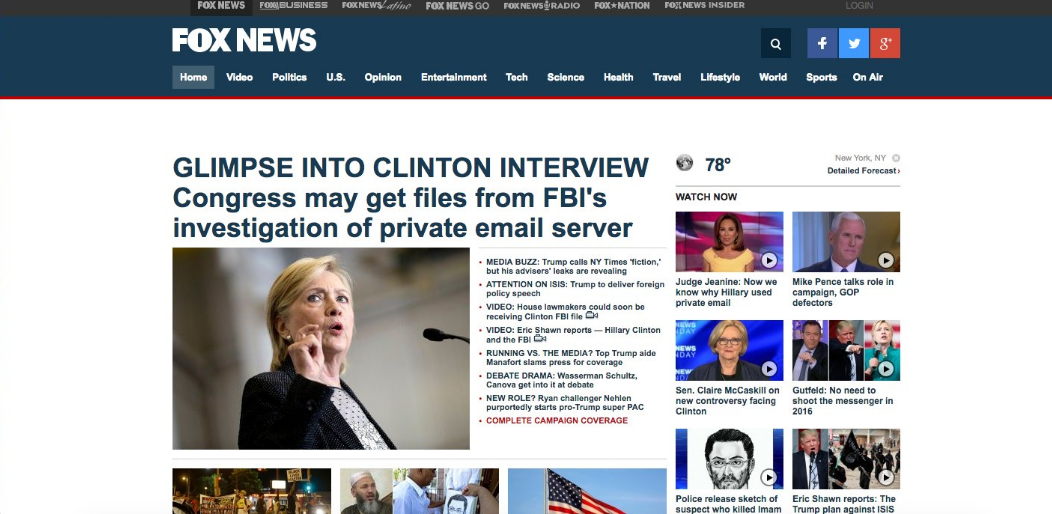We don't need another think piece on how the national media failed to cover the Louisiana flooding for multiple days. If you want to read (appropriately) angry pieces on the issue see Salon, The Daily Signal, and nola.com. [Bonus: a half-assed apology from NYT]. This post will be about the role of disaster reporting within the "emergency management system".
Four days of deafening silence.
As large portions of Louisiana took on water locals, along with state and federal agencies initiated 30,000 rescues and every disaster nonprofit in the United States descended. There was one institution obviously, and painfully absent -- the national media. Throughout the weekend I took screenshots of the main pages of multiple media sites where there was not a single mention that a full-fledged disaster was unfolding on America soil.
In a flood event that's damage is ranking it among some of the worst hurricanes in US history, the national media was silent for days. It is impossible to imagine no national coverage during a Hurricane Ivan or a Hurricane Andrew. While those in Louisiana were busy in response, those of us outside the state went after the media -- and many of us did so with an err of desperation.
The emergency management system is the culmination of government, nonprofits, businesses, individuals, AND media working together. The media is a tool through which important coordination, communication, and accountability takes place. Here's the problem: The national media forgot that they are a critical stakeholder in emergency management.
The role of the national media.
Hurricane Katrina is characterized by failures. Failures of local government, state government, federal government and beyond. It was an unparalleled catastrophe for a number of reasons but in the immediate aftermath, there was one stakeholder group who consistently tried to do their job -- the national media. During the response to Hurricane Katrina, the national media stepped up. Anderson Cooper's interview with then Senator Landrieu is etched in the minds of many. They did their jobs in those first few weeks. It was in the years following, except for the annual anniversary, that they failed to continue to shine their spotlight on those living through recovery.
Katrina was an outlier for sure. I would rate the news coverage of a typical disaster a C average. For the big disasters, they'll stick around for a few days, maybe a whole week. They'll cover the flashy things - the search and rescue, the rows and rows of shelter beds, the feel-good stories of people driving in from out of state with donations, and the inevitable story of the grade schooler across the country who holds a bake sale. There is a formula for the stories they tell.
Despite being formulaic, this national news coverage is CRITICAL for the communities that have experienced disasters. These national news stories are what puts pressure on the government to create recovery programs. These national news stories bring attention to issues of crumbling infrastructure, sustainable building, climate change, and raise general awareness of natural hazards. Perhaps most importantly national mainstream media coverage is that it inspires donations and volunteerism.
At minimum the national media should be doing the following during the response phase of every disaster:
- Communicate warnings and critical information to the public
- Help communicate needs from the public to officials
- Hold government officials and agencies responsible for their actions
- Visually show what is happening on the ground -- where needs are being met & where they are not.
- Incite citizens in non-impacted area to put pressure on their congressional representatives to approve federal funding for the impacted areas.
- Explore the underlying reasons for the cause of the disaster and hold accountable those who contributed to the situation.
- Directing donations and volunteers where local officials want them
There is evidence to suggest that there is a correlation between the amount of time a disaster is covered in the media and the amount of donations (specifically monetary donations) that are given to the disaster nonprofits. Much of this money is spent on the immediate lifesaving measures such as running shelters and replacing immediate necessities like clothing. As I've written about previously, it is during the recovery that volunteers and financial donations are most needed. Perhaps this is because the media isn't there to show donors the need.
Now, none of this is to say that the national media is flawless. Their disaster coverage is often laced with racism, is exploitive of poor people, and perpetuates "disaster myths" such as widespread looting and violence. They must do better. Outside of response coverage the national media often fails to cover the recovery process, particularly instances of exploitive actions from government, elites, and businesses. In non-disaster times they rarely communicate hazard risk or provide coverage of ongoing preparedness or mitigation efforts. They consistently fail to interview or consult emergency management scholars and often ask climatologists and meteorologists about issues of preparedness and response. I don't answer questions about meteorology or climatology so I don't know how they can be expected to answer questions about disasterology.
What the media should be doing.
As I wrote for Vox this week (s/o to Vox for being responsive to my desperate tweeting), "with the advent of climate change, there is an urgent need to make changes to this system". One of those changes is how the national media covers disasters.
To start with, they need to cover them. As little coverage as there was on the flooding in Louisiana over the past week, there's been even less coverage of the 80,000 people who were evacuated in Southern California when a wildfire unexpectedly grew out of control. Sure, cover the presidential campaign, but don't do it at the expense of disaster survivors across this country.
Secondly, the national media needs to recognize their role in the emergency management system. The decision to cover disasters cannot be made based on how many clicks it will get. In fact, covering a disaster should never be a decision. When a disaster happens you drop everything and you get someone there. You get the interviews and you get it posted and streaming. Coverage of disaster literally can influence how that disaster unfolds -- it can save lives, it can ease the financial burden of recovery.
Finally, now is the time that the national media needs to be upping their coverage of disasters. They need to explicitly draw connections between disasters and climate change, they need to be interrogating the agencies and organizations that are supposed to be building "resilient" and "sustainable" cities. They need to be talking to local governments about what their needs are for mitigations measures to be implemented. They need to be checking in with communities who are in years-long recovery processes to expose the failures and highlight the successes. The national media needs to help hold the rest of us in the emergency management system accountable. ALL of us -- someone PLEASE ask me why there hasn't been more academic emergency management research. Ask me why we don't know more about how to manage disasters and ask me why what we do know isn't implemented.
If they are insistent on a Trump headline then at lease do a piece on what his emergency management policy would be.
*Disclaimer: the role of local media and national media are different. I've just addressed national media here.
** This mostly all applies with non-domestic disasters too. I've written previously about the lack of coverage for disasters outside the United States that do not impact US interests and the repercussions for organizations working in those places.



